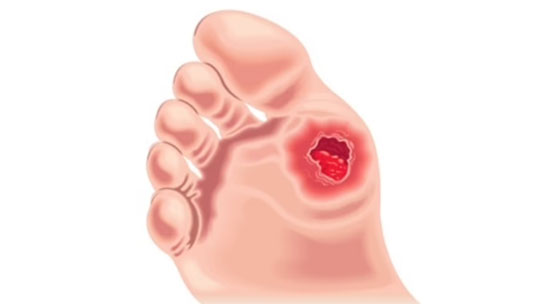Diabetic Ulcer
Diabetic Foot Ulcers of the foot are a major complication of diabetes mellitus. They are characterized by a large lesion most commonly found on the bottom of the heel. Diabetic Foot Ulcers can be extremely dangerous due to the loss of sensitivity and nerve damage. Those that suffer from diabetes should take care to check the foot regularly for possible lesions. Diabetic Foot Ulcers are the most common foot injuries associated with lower extremity amputation.
WHAT CAUSES A DIABETIC FOOT ULCER?
Diabetic foot ulcers are caused by neuropathic nerve damage and vascular complications of diabetes.
HOW DO I KNOW IF I HAVE A DIABETIC FOOT ULCER?
WHAT ARE THE SYMPTOMS OF DIABETIC FOOT ULCERS?
Symptoms of Diabetic Foot Ulcers include:
- Loss of feeling in the foot and / or leg
- Skin loss
- Blisters that are draining
- Impaired healing of wounds
- Redness, warmth or inflammation of part of the foot
HOW ARE DIABETIC FOOT ULCERS DIAGNOSED?
Diabetic Foot Ulcers are commonly diagnosed by a podiatrists and orhthopedic surgeons. These ulcers are frequently painless and left untreated. In severe cases partial or complete gangrene can occur.
WHAT CAN I DO FROM HOME FOR A DIABETIC FOOT ULCER?
WHAT CAN I DO TO PREVENT DIABETIC FOOT ULCERS?
Prevention of Diabetic Foot Ulcers include:
- Having your feet regularly examined by a doctor and checking them daily on your own
- Washing, drying, and moisturizing regularly
- Always wearing socks with shoes
- Do not walk barefoot
- Wearing specialty shoes
WHAT TREATMENTS CAN I DO FROM HOME FOR DIABETIC FOOT ULCERS?
Caring for the infection includes:
- Administration of necessary antibiotics
- Debridgement – the removal of dead, damaged, or infected tissue (done by your health professional)
- Frequent dressing changes
- Relieving the pressure of the ulcerated part through elevation
- Optimal diabetes management
WHEN SHOULD I SEE A DOCTOR FOR DIABETIC FOOT ULCERS?
You should see a doctor immediately if you have any possible signs of infection. Ulcers are serious and should be treated right away. Even if there are no signs of infection diabetes makes any woulnd on the foot a serious risk for infection and amputation.
TREATMENTS YOUR DOCTOR MAY RECOMMEND FOR DIABETIC FOOT ULCERS
Minor infections of Diabetic Ulcers can be treated through wound management and antibiotics. In some cases the removal of the infected tissue is necessary. In more extreme cases amputation can occur.

